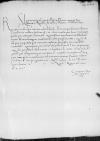Reverendo in Christo Patri, domino ⌊Ioanni episcopo Varmiensi⌋, sincere nobis dilecto
⌊Sigismundus⌋ Dei gratia rex ⌊Poloniae⌋, magnus dux ⌊Lituaniae⌋, ⌊Russiae⌋, ⌊Prussiae⌋, ⌊Masoviae⌋ etc. dominus et heres
Reverende in Christo Pater, sincere nobis dilecte.
Errore quodam scribarum cancellariae nostrae factum est, ut alius ⌊comitiorum⌋ locus sit descriptus, quam quo conveniri consuevit. Quare Paternitati Tuae mandamus, ut ad solitum locum ⌊Mariemburgum⌋ ⌊comitiorum⌋ causa proficiscatur atque ibi de iis, quae proposita per nuntium nostrum fuerint, una cum aliis consultet. Quamquam prioribus etiam litteris nostris Paternitati Tuae scripseramus atque illi potestatem dederamus, ut legitima de causa alium in locum, quam qui designatus per nos fuerat, comitia transferre Paternitati Tuae una cum aliis ⌊consiliariis terrarum nostrarum Prussiae⌋ liceret. Factura Paternitas Tua pro gratia nostra.
Datae
⌊Vilnae⌋, XXXV-a Martii anno Domini M-o D-o XLI-o, regni nostri anno XXXV-o.
Commissio ⌊regiae maiestatis⌋ propria

